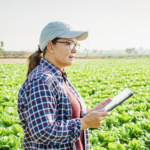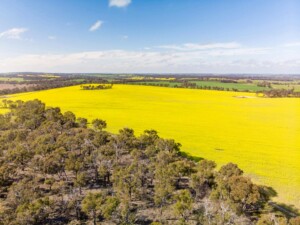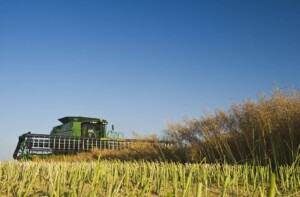Canola Quick Bytes
A supplement to U.S. Canola Digest
Capitol Hill
 House Agriculture Chair Glenn Thompson announced on April 16 that before Memorial Day, “the House Committee on Agriculture will consider a farm bill that responds to a variety of crisis points, constituent priorities, needs of rural communities, and the demands of the current economy, both domestically and abroad.” It will propose to maintain the Supplemental Nutrition Assistance Program as well as increase reference prices, “access and affordability” for crop insurance, base acres and trade-related, research and specialty crop funding. Moreover, the draft bill will propose to move the remaining $14 billion in conservation funding enacted under the Inflation Reduction Act into the farm bill Title II baseline, which would result in a 25% increase in baseline funding in perpetuity. (Photo: Canola Council of Canada.) House Agriculture Chair Glenn Thompson announced on April 16 that before Memorial Day, “the House Committee on Agriculture will consider a farm bill that responds to a variety of crisis points, constituent priorities, needs of rural communities, and the demands of the current economy, both domestically and abroad.” It will propose to maintain the Supplemental Nutrition Assistance Program as well as increase reference prices, “access and affordability” for crop insurance, base acres and trade-related, research and specialty crop funding. Moreover, the draft bill will propose to move the remaining $14 billion in conservation funding enacted under the Inflation Reduction Act into the farm bill Title II baseline, which would result in a 25% increase in baseline funding in perpetuity. (Photo: Canola Council of Canada.)
The Environmental Protection Agency (EPA) published on April 16 an update to its draft Herbicide Strategy and intends to publish the final version by the court-negotiated deadline of Aug. 30, 2024. The strategy describes whether, how much and where mitigations may be needed to protect federally listed species from agricultural uses of conventional herbicides. The EPA will continue to work on it with the U.S. Department of Agriculture (USDA), holding a joint workshop in May to identify other potential improvements. The primary proposed improvements are: 1) making the strategy easier to understand, 2) increasing the flexibility for growers to implement mitigations, and 3) reducing the degree of mitigations when growers have already adopted practices to reduce pesticide runoff or where runoff is minimal.
 The U.S. Canola Association joined other biofuel stakeholders in an April 19 letter to the EPA requesting that it propose and finalize the 2026 Renewable Fuel Standard volumes by the statutory deadline of November 2024 to avoid future delays in compliance deadlines. They also asked that the EPA make full use of available data on actual renewable fuel production as well as current and future availability of feedstocks. The U.S. Canola Association joined other biofuel stakeholders in an April 19 letter to the EPA requesting that it propose and finalize the 2026 Renewable Fuel Standard volumes by the statutory deadline of November 2024 to avoid future delays in compliance deadlines. They also asked that the EPA make full use of available data on actual renewable fuel production as well as current and future availability of feedstocks.
Sen. John Hoeven (R-N.D.) of the Senate Agriculture Committee introduced on April 9 the Federal Agriculture Risk Management Enhancement and Resilience (FARMER) Act to increase premium support for crop insurance and make higher levels of coverage more affordable. He said the bill would “increase premium support for higher levels of crop insurance coverage, which will enhance affordability and reduce the need for ad-hoc disaster assistance.” Co-sponsors of the bill include Republican Senators John Boozman (Ark.), Joni Ernst and Chuck Grassley (Iowa), Deb Fischer (Neb.), Roger Marshall (Kan.), and Cindy Hyde-Smith (Miss.)
Agronomy
 The annual BeSure! campaign reminds growers of proper stewardship practices during planting season to help protect pollinators. Resources are available from the Growing Matters coalition, American Seed Trade Association and CropLife America. The annual BeSure! campaign reminds growers of proper stewardship practices during planting season to help protect pollinators. Resources are available from the Growing Matters coalition, American Seed Trade Association and CropLife America.
Nutrition
 The Departments of Health and Human Services and Agriculture encourage the public to register to virtually attend the 2025 Dietary Guidelines Advisory Committee’s fifth meeting on May 29 from 1 pm to 5:30 pm ET and May 30 from 8:30 am to 4 pm ET. The Committee will discuss progress made since its last meeting, including protocol development, evidence review and synthesis, draft conclusion statements, and plans for future work. Written public comments can also be submitted to the Committee, which will meet about six times in total. It should conclude its work in late 2024. The Departments of Health and Human Services and Agriculture encourage the public to register to virtually attend the 2025 Dietary Guidelines Advisory Committee’s fifth meeting on May 29 from 1 pm to 5:30 pm ET and May 30 from 8:30 am to 4 pm ET. The Committee will discuss progress made since its last meeting, including protocol development, evidence review and synthesis, draft conclusion statements, and plans for future work. Written public comments can also be submitted to the Committee, which will meet about six times in total. It should conclude its work in late 2024.
Other Countries
 Australia canola production is poised for a fourth consecutive strong season in 2024-25 due to more favorable prices than wheat and barley, according to the USDA’s Foreign Agricultural Service. If realized, production will be about 6.5 million tonnes – 14% above the previous year’s estimate and the third largest crop on record. Canola exports are forecast to rise by 16% to 5.1 million metric tonnes, namely for canola oil, which are forecast to grow by 21% in the 2024-25 marketing year as the highest on record. Australia canola production is poised for a fourth consecutive strong season in 2024-25 due to more favorable prices than wheat and barley, according to the USDA’s Foreign Agricultural Service. If realized, production will be about 6.5 million tonnes – 14% above the previous year’s estimate and the third largest crop on record. Canola exports are forecast to rise by 16% to 5.1 million metric tonnes, namely for canola oil, which are forecast to grow by 21% in the 2024-25 marketing year as the highest on record.
Imperial Strathcona Refinery in Alberta, Canada is receiving a 12% tax credit for the construction of a $720-million canola-based renewable diesel facility that will require millions of metric tons of canola seed per year. The credit comes from the Province of Alberta’s Agri-Processing Investment Tax Credit, which offers a non-refundable credit when corporations invest $10 million or more in a project that builds or expands a value-added agri-processing facility in the province.
Latest Industry News

On April 30, the U.S. Department of the Treasury released guidance on the Sustainable Aviation Fuel (SAF) Section 40B tax credit implementation. In order to enable crop-based biofuels to meet the carbon-intensity scores necessary to qualify for this tax credit, the department is establishing a “Climate-Smart Ag Pilot Program” for corn and soybeans in which SAF producers would contract with farmers to grow these crops using prescribed practices. The growers must keep records of these practices and be subject to third-party verification/certification. The 40B tax credit is a stepping-stone to implementation of the Section 45Z tax credit for renewable fuels, which will be based on carbon-intensity scores and goes into effect Jan. 1, 2025. The 45Z credit will have far greater impact on canola and other agricultural feedstocks for biodiesel and renewable diesel. The USCA is working to get canola fully incorporated into the GREET model, update the Induced Land Use Change (ILUC) values for canola and get separate ILUC values for winter canola.
The California Air Resources Board (CARB) is considering potentially burdensome certification requirements for biofuel production to ensure that does not come at the expense of deforestation or food production. The proposal could include a requirement for independent feedstock certification that is subject to auditing, including site visit(s) and:
- Confirmation of land use change date (before/after 2008)
- Ensuring crop practices meet sustainability requirements
- Review of management systems and social practices (e.g., worker treatment)
- Compliance with all applicable regional, national laws and international laws
- Assessment of economic sustainability (e.g., farm)
CARB will accept written comments following a workshop and the USCA will submit comments individually or in conjunction with other stakeholders.
 The Minnesota Canola Council (MCC) was awarded a two-year grant in the amount of $90,000 by the Minnesota Department of Agriculture’s Agricultural Growth, Research, and Innovation Program to study direct-harvest canola strategies intended to increase harvest efficiency and profitability. In addition, the 2022-23 MCC Annual Report and 2023 Canola Production Centre Report are available. Its 2024 Canola Field Day and Hackers Golf Scramble will be Wed., July 17 at Roseau Oakcrest Golf Club. (Photo: Canola Council of Canada.) The Minnesota Canola Council (MCC) was awarded a two-year grant in the amount of $90,000 by the Minnesota Department of Agriculture’s Agricultural Growth, Research, and Innovation Program to study direct-harvest canola strategies intended to increase harvest efficiency and profitability. In addition, the 2022-23 MCC Annual Report and 2023 Canola Production Centre Report are available. Its 2024 Canola Field Day and Hackers Golf Scramble will be Wed., July 17 at Roseau Oakcrest Golf Club. (Photo: Canola Council of Canada.)
The Pacific Northwest Canola Association is hosting three, in-field canola production workshops this month: May 16-17 in Washington and May 23 in Idaho.
In Red River Farm Network’s April 26 “Canola Minute”, Northern Canola Growers Association (NCGA) Executive Director Barry Coleman noted that crop insurance planting dates for canola will increase as of the 2025 planting season to allow additional time to get the crop in the ground. Most significantly, an extra 10 days will be allowed for planting in southwest N.D. and an extra five days in the southeast until May 25.
Videos remain available from the “Getting it Right in Canola Production” virtual meeting on March 12 hosted by North Dakota State University Extension and supported by the NCGA. Topics include cultivar selection, seeding rate, plant establishment and intercropping, fertilizer recommendations, and disease, insect and weed management.
About the USCA
 The U.S. Canola Association’s (USCA’s) application to join Field to Market – a membership-based organization that defines, measures and advances the sustainability of food, feed, fiber and fuel production in North America – was accepted. Field to Market’s vision is to “harness the collective action of the value chain to support resilient ecosystems and enhance farmer livelihoods.” To this end, it analyzes multiple sustainability metrics to enable farmers to consider trade-offs across outcomes. As a Field to Market member, the USCA will have the opportunity to drive continuous improvement in canola fields; collaborate for impact with 160+ like-minded organizations; assess the environmental performance of canola management practices against state and national benchmarks via a National Indicators Report; and enable its canola-growing members to assess the environmental performance of their operations through the Fieldprint Platform. The U.S. Canola Association’s (USCA’s) application to join Field to Market – a membership-based organization that defines, measures and advances the sustainability of food, feed, fiber and fuel production in North America – was accepted. Field to Market’s vision is to “harness the collective action of the value chain to support resilient ecosystems and enhance farmer livelihoods.” To this end, it analyzes multiple sustainability metrics to enable farmers to consider trade-offs across outcomes. As a Field to Market member, the USCA will have the opportunity to drive continuous improvement in canola fields; collaborate for impact with 160+ like-minded organizations; assess the environmental performance of canola management practices against state and national benchmarks via a National Indicators Report; and enable its canola-growing members to assess the environmental performance of their operations through the Fieldprint Platform.
The autumn USCA board meeting will be in San Diego, Calif., Mon.-Wed., Nov. 11-13.
Want to see exactly where spring and winter canola is growing in the United States? The USCA has a canola acreage map by county on its website.
Get social with us on Instagram, LinkedIn, Facebook, Twitter and YouTube.
Want to promote your products or services to canola producers and industry members? Visit our advertising pages to find specs, deadlines and rates to advertise in this monthly e-newsletter or on UScanola.com.
|
 House Agriculture Chair Glenn Thompson announced on April 16 that before Memorial Day, “the House Committee on Agriculture will consider a farm bill that responds to a variety of crisis points, constituent priorities, needs of rural communities, and the demands of the current economy, both domestically and abroad.” It will propose to maintain the Supplemental Nutrition Assistance Program as well as increase reference prices, “access and affordability” for crop insurance, base acres and trade-related, research and specialty crop funding. Moreover, the draft bill will propose to move the remaining $14 billion in conservation funding enacted under the Inflation Reduction Act into the farm bill Title II baseline, which would result in a 25% increase in baseline funding in perpetuity. (Photo: Canola Council of Canada.)
House Agriculture Chair Glenn Thompson announced on April 16 that before Memorial Day, “the House Committee on Agriculture will consider a farm bill that responds to a variety of crisis points, constituent priorities, needs of rural communities, and the demands of the current economy, both domestically and abroad.” It will propose to maintain the Supplemental Nutrition Assistance Program as well as increase reference prices, “access and affordability” for crop insurance, base acres and trade-related, research and specialty crop funding. Moreover, the draft bill will propose to move the remaining $14 billion in conservation funding enacted under the Inflation Reduction Act into the farm bill Title II baseline, which would result in a 25% increase in baseline funding in perpetuity. (Photo: Canola Council of Canada.) The U.S. Canola Association joined other biofuel stakeholders in an April 19 letter to the EPA requesting that it propose and finalize the 2026 Renewable Fuel Standard volumes by the statutory deadline of November 2024 to avoid future delays in compliance deadlines. They also asked that the EPA make full use of available data on actual renewable fuel production as well as current and future availability of feedstocks.
The U.S. Canola Association joined other biofuel stakeholders in an April 19 letter to the EPA requesting that it propose and finalize the 2026 Renewable Fuel Standard volumes by the statutory deadline of November 2024 to avoid future delays in compliance deadlines. They also asked that the EPA make full use of available data on actual renewable fuel production as well as current and future availability of feedstocks.
 The annual BeSure! campaign reminds growers of proper stewardship practices during planting season to help protect pollinators. Resources are available from the
The annual BeSure! campaign reminds growers of proper stewardship practices during planting season to help protect pollinators. Resources are available from the  The Departments of Health and Human Services and Agriculture encourage the public to
The Departments of Health and Human Services and Agriculture encourage the public to  Australia canola production is poised for a fourth consecutive strong season in 2024-25 due to more favorable prices than wheat and barley, according to the
Australia canola production is poised for a fourth consecutive strong season in 2024-25 due to more favorable prices than wheat and barley, according to the 
 The Minnesota Canola Council (MCC) was awarded a two-year grant in the amount of $90,000 by the
The Minnesota Canola Council (MCC) was awarded a two-year grant in the amount of $90,000 by the  The U.S. Canola Association’s (USCA’s) application to join
The U.S. Canola Association’s (USCA’s) application to join